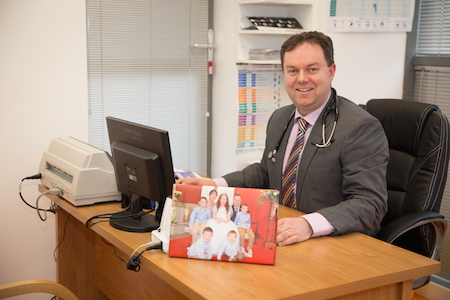Continuing our medical column, this week Dr Ciaran Roarty of Scally/McDaid Medical Practice discusses acid reflux which is the main cause of heartburn.
Food normally passes down our gullet (oesophagus) to our stomach where acid and other chemicals are produced to help the digestive process.
A circular band of muscle around the junction of our stomach and gullet keeps acid and food in our stomach. It then relaxes to let food pass into our stomach on the way down.
If this band of muscle does not work very well we can get acid and food leaking back up into the gullet. The lining of our gullet is different and has little protection from acid so that if acid leaks from our stomach up into out gullet it can cause discomfort.
Although quite common, we often don’t know why this band of muscle doesn’t always function as it should.
Some contributory factors include increased stomach pressure – for example due to pregnancy, after a large meal or bending forward and the condition known as hiatus hernia ( where the stomach protrudes a little into the chest)
Symptoms:
The most common symptom is heartburn, (affects 1 in 10 of us once a day).
It feels like burning sensation from the upper tummy or lower chest towards the neck.
Other common symptoms include pain the upper abdomen and chest, nausea, an acid taste in the mouth, burping, bloating, indigestion and a burning sensation when drinking something hot.
Less common symptoms include a persistent cough, particularly at night, worsening of asthma symptoms, gum problems, bad breath, sore throat, hoarseness and the sensation of something in your throat. These often come and go.
Diagnostic Tests:
Usually not required when typical symptoms are present. If treatment is successful the diagnosis is presumed acid reflux. However, if symptoms are severe, do not improve with treatment or are judged to be atypical then your doctor may organise further tests such as a camera test to look at your stomach. A chest xray, an ECG ( a tracing of the heart) and other tests may be carried out to rule out other conditions if your symptoms are not typical.
Treatments used:
General advice:
Stop smoking (chemicals in smoke affect the circular band of muscle)
Avoid exacerbating foods eg tomatoes, spicy foods, very hot drinks, coffee and alcohol.
Avoid exacerbating medicines eg ibuprofen
Lose weight
Improve your posture – avoid hunching over.
Avoid food and drink before bedtime
Raise the head of the bed.
Medications: antacids.
Acid–suppressing medication and may be prescribed by your doctor.
Surgery – generally not used nowadays.
Most people do not have any further complications but if you have any difficulty or pain when swallowing you should consult with your GP.
Dr Ciaran Roarty MICGP is in full-time clinical practice at Scally McDaid Medical Practice, Scally Place Letterkenny, Tel 0749164111
The column is intended as advice only. Should any of these issues affect you, or indeed if you have any queries relating to your health, you should contact your General Practitioner.
Tags:







